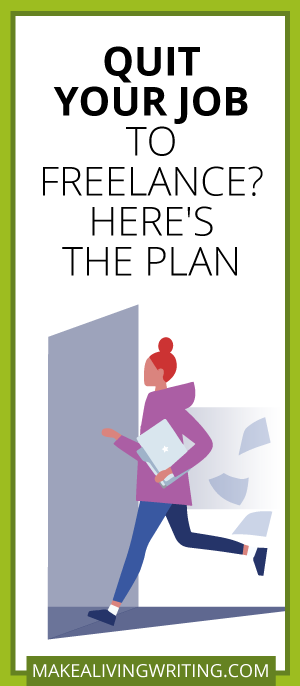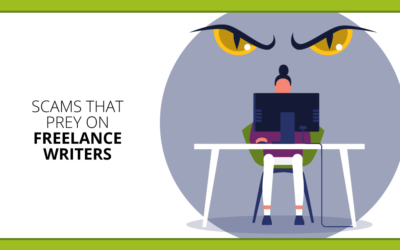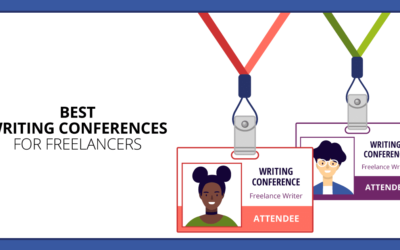
There’s a lot of unknowns right now. Wouldn’t it be nice to have a little more control over your income, your schedule, and your life?
When you’re a freelancer, you’re not at the mercy of a global pandemic, a hard-to-work-with manager, or the day-to-day drudgery of work you hate.
You make the rules. You’re the boss. Your schedule, your workload, and your income depends on you.
If you’re thinking about this, chances are pretty good you’ve got questions:
Do you have what it takes? Can you get freelance writing clients? Will you be able to pay your bills and do meaningful work?
The answer: Yes, you can. I quit my job as a mid-career teacher to be a freelancer. But instead of taking the side-hustle-for-years route, I decided to go with the sink-or-swim approach.
Ready to quit your job to be a freelance writer? Here’s what you need to know:
A former teacher’s sink-or-swim plan for freelance writing

Cevia Yellin
A few years ago I had a shocking revelation: Freelance writing is a real career path. And I wanted it…bad.
And then I read this post by Carol Tice: The 3 Types of People Who Fail At Freelance Writing, and my heart sank.
Crap. I knew just from the title this post was about ME.
Here’s the short version: You’re going to fail at freelance writing if you lack self-discipline, you’re emotionally fragile, and you’re not fluent.
Does the voice inside your head sound anything like this? Darn, this is going to be hard. I’m not just one of these types of people…I’m all three.
That’s exactly what I thought seven months after I quit my job as a university English language instructor.
Are you ready to quit your job?
It’s not an easy decision at all, in a lot of cases. There’s the steady paycheck, regular work hours, and familiar colleagues. And if you’ve been pursuing one specific career path for years, it can be even harder.
But if full-time freelancing is in your future, there’s bound to be a tipping point.
Here’s how it happened to me:
Even though I was a capable and competent teacher, and accomplished in my field, after 14 years, it was clearly over.
My work environment was toxic and my doctor had repeatedly encouraged me to leave. I was at high risk for a serious hereditary disease and could not afford the toll it was taking on my health.
So, I had to make this work. I needed an income. My health insurance premiums were due. And I needed a flexible schedule so I could attend to my health and get back East to visit my father who was terminally ill.
So even though I didn’t fit the bill of a successful freelance writer, I had to make it work.
If you’ve reached that tipping point one way or another, here’s what you need to know to make this work:
1. Set process goals
Setting goals is the first step in gaining the discipline a lot of newbie freelance writer’s lack. Self-discipline is crucial to your success as a freelancer. Make a list of short and/or long-term process goals (things you can actually do and control).
- What needs to get done today, this week, this month?
- What do you want (or need) to achieve in the next six months or year?
- Over the course of the next two to five years?
- How many hours a day, week, month, can you realistically commit to working on your goals?
2. Establish a routine
If you’re used to working a traditional “day job,” the lack of a routine can really throw you off kilter when you jump into freelance writing. It can mess with your head, even your sense of identity.
Note: I was a self-confessed work-a-holic in my former career. Put in very long hours. And here, trying to make a go of freelancing, I was floundering like a fish out of water.
If you’re going for the sink-or-swim approach to freelancing, you’ve got to be prepared for the learning curve, and the fact that you won’t have a boss telling you what to do. If you don’t plan for this, you’ll be spinning your wheels wasting time, when you could be making money as a freelancer.
Believe me, I know what it’s like. I vacillated between spending hours and hours immersed in reading about freelancing to avoiding it all together. And I was also working side jobs, making ends meet (barely) teaching yoga and cooking, cleaning, gardening, tutoring…you name it!
The remedy to this problem…routine
After you set freelance writing goals, create a routine and a plan for how you will spend your time:
Decide what you can and can’t do during those hours and stick to it. Those hours are for working on your freelance business – researching, writing, marketing, editing, marketing, and more marketing.
You’re in control of your schedule now. But you can’t spend all day every day on doctor’s appointments, cleaning, doing the laundry, scrubbing the bathroom floor, or having coffee with your neighbor.
Your work hours are for freelance writing and marketing (whip cracking!). Got it?
3. Find a conducive workspace
Where do you FEEL productive? Is there a dedicated space in your home where you can work uninterrupted? A spare room, corner, living room, or office?
Something that helped me a lot initially was working outside of the house. Coffee shop. Library. The local community college. My favorite bagel shop. Or maybe you could find a co-working space like The Riverter, a favorite for Carol Tice.
Find a place to work that fosters creativity and productivity. If you don’t, it can mess with your mojo big time.
- If you can afford it, consider renting office space. I earned more from freelance writing the month I signed my lease than I had in any single month prior, breaking $3,000 for the first time. I even met a new client in the communal kitchen! This fellow tenant, a holistic doctor, needed help with his blog. Bonus…he also hired me as a speech writing/public-speaking consultant. Double win!
4. Strengthen your emotional side
Do you take rejection personally? Are you devastated when your queries go unanswered or worse, are outright rejected? Are you emotionally fragile and sensitive?
That basically describes me when I quit my job to be a full-time freelance writer. And it’s why the first two years were really hard.
If you’re nodding your head, rest assured you can strengthen your emotional side. Here’s how:
- Learn that getting freelance writing clients is largely a “numbers game.” This will help take the sting out of rejection.
- Know that the “odds” can help you detach a bit from feeling personally rejected. Is it hard for you to recover when you don’t win the lottery? See, not so hard to handle your pitch being denied after all!
- And if you can’t seem to get past those feelings of total failure, it may be a sign of a deeper distress or trauma that needs the attention of a counselor or therapist.
If you’re an introvert or highly sensitive (I’m both), you can learn not to take the losses in freelance writing personally. Be a bit detached from the work. Do your best and move on.
5. Learn the language of freelance writing
My take on fluency, as a newbie in this biz, has more to do with the language of freelancing, than English language fluency. (If you’re an ESL writer trying to freelance for U.S. clients, read this.)
What’s your freelance writing fluency?
Like any profession, freelance writing has its own unique vocabulary. And just like learning a new language or traveling to a foreign country, it takes time to understand the lingo, to get the lay of the land, to figure out how things are done.
It’s very similar to the stage in second language acquisition called the silent period – when people new to a language are absorbing it, but not yet producing it. Emerging from this stage can take as long as a few months up to a year or more.
My advice to speed up the process
Read this blog. I read countless posts, listened to podcasts, and consumed materials in the Freelance Writers Den. And I wrote down key words and phrases to study. Little by little, I started to incorporate those things into my pitches and conversations with prospects and clients.
Pretty soon, I was charging $250 per article vs. $60 for the same kind of work I was doing months earlier when I wasn’t as fluent.
Jump into freelance writing…you can do this
You might be feeling like a freelance writing failure – stalled by fear-inspired procrastination, lost in the details, or like you’ve landed in a place where you don’t speak the language. Maybe even all three. But, if you really want this – you can make it happen!
Ready to quit your job to freelance full time? Let’s discuss in the comments below.
Cevia Yellin is a freelance writer in the Freelance Writer’s Den 2X Income Accelerator. She believes in going after your wildest dreams, even when the odds are against you.










